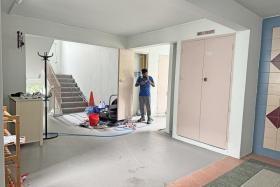Thirst for bottled water growing in Singapore
Consumers spent $134 million on it in 2015, but health benefits are not proven
Getting clean water in Singapore is as easy as turning on the tap, yet retail outlets are awash with a wide array of bottled water.
Data from research firm Euro- monitor International shows the thirst for bottled water is growing here. Consumers spent $134 million on it in 2015, nearly 24 per cent more than in 2010.
More than 12 brands of bottled water are sold here and more have recently been added to the shelves.
Two brands of alkaline water were introduced at Sheng Siong supermarket chain last year.
Alkaline water has higher-than- usual pH levels and is touted to have health benefits, though these have not been proven.
In fact, as brands come up with new ways to make their products stand out, the question is: Do their marketing claims hold water?
And ultimately, should one be drinking bottled water at all?
Experts say there are differences in the sources and treatment process, but it is difficult to say if one type is better than another.
They also emphasise that tap water in Singapore is safe for drinking.
GOOD, BAD OR PLAIN GIMMICK?
The Agri-Food and Veterinary Authority of Singapore (AVA) regulates the import of bottled water into Singapore.
AVA classifies brands into five types, based on the source of the water and the way the water is treated. They are natural mineral water, packaged drinking water, mineralised drinking water, distilled water and spring water.
Dr Wuang Shy Chyi, domain lead for water technology at Temasek Polytechnic’s school of applied science, said each type of water comes with its own set of claims.
For example, due to their natural sources, mineral water can contain trace amounts of elements.
Some, like arsenic, can be beneficial in tiny quantities.
But others may not be good for the body.“Some minerals, like fluoride, may also be present in quantities that are not acceptable to certain groups of people,” Dr Wuang said.
They include infants and young children, who already get fluoride that is added to tap water.
A 2012 study by the Harvard School of Public Health found that children in high-fluoride areas had significantly lower IQ scores than those who lived in low-fluoride areas. “So, while it’s good to have natural minerals, it is also important to check the contents,” she added.
While it may be an “over-generalisation” to determine which type of water is better, Dr Wuang said that a greater awareness of each type of drinking water can potentially help “consumers make informed choices”.
Associate Professor Richard Webster from Nanyang Technological University’s School of Physical and Mathematical Sciences said that water marketed as artisan or untouched by humans is not better.“It is just a marketing gimmick,” he said. “There is no real difference from other bottled water.”
The benefits of a new entrant – water with added oxygen – are also unproven, said Prof Webster.“We get enough oxygen from breathing air, so adding it to water will not make any difference,” he added.
Home-grown water treatment specialist Hyflux is working with Changi General Hospital (CGH) to see if its oxygenated Elo Water can help diabetic patients achieve better glycaemic control.
This follows a 2008 study by Harvard Medical School and Erasmus University Medical Centre in Rotterdam, Netherlands, which found that people with diabetes have 10 to 50 per cent lower tissue oxygen levels.
It was previously reported that studies have found that Elo Water improved tissue oxygen levels in animal and human tissue.
For the consumer, however, price appears to be the main criterion for choosing bottled water.
A FairPrice spokesman said sales for the budget range of bottled water has increased.
Similarly, in Sheng Siong, the cheapest bottled water is the most popular.
But the fact that the water is bottled can raise environmental concerns.
The website of non-profit organisation The Water Project states that these plastic bottles take more than 1,000 years to biodegrade, and they also produce toxic fumes if incinerated.
It also takes an estimated 3 litres of water to package a 1-litre bottle. And bottled water burns a bigger hole in the pocket too.
According to national water agency PUB, tap water can be 1,000 times cheaper than bottled water.
A 600ml bottle of drinking water costs between 50 cents and $1, while tap water costs 0.1 cent for the same amount.
Giving his assessment of the tap water in Singapore, Dr Webster said: “It is better than what is available in many other countries.”
Get The New Paper on your phone with the free TNP app. Download from the Apple App Store or Google Play Store now



